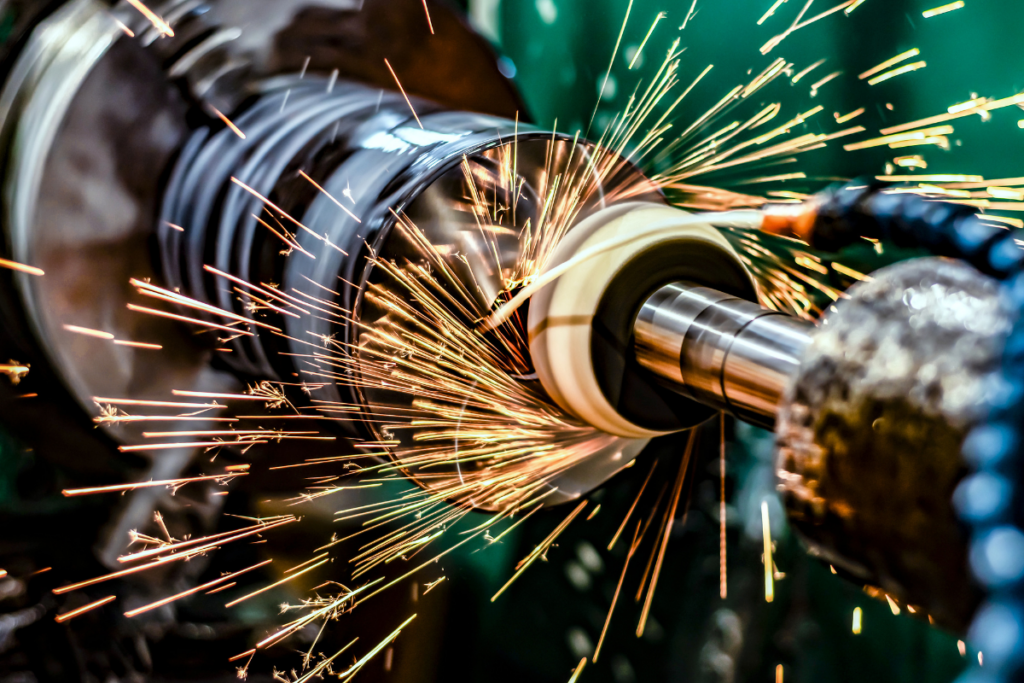As a leading precision machining supplier, Kenona Industries part of our Arrow Automotive division specializes in using high-tech tools and processes to create high-quality custom parts and components for our customers’ products.
We commonly use three tech-based processes to create our fabrication solutions: turning, milling, and grinding. In this month’s blog, we’ll help you discover the details behind these techniques, how they work together to create finely crafted metal components, and the benefits they offer.
CNC Machining: Where Precision Machining Begins
Computer Numerical Control (CNC) machining is an advanced manufacturing process offering manufacturers unprecedented accuracy, quality, and repeatability in precision machining.
At the core of CNC machining is its ability to automate the guiding of cutting and grinding tools without human intervention. It accomplishes this through its specialized software that translates digital designs into a series of instructions for the cutting tools to follow. The instructions enable the tools to make precise three-dimensional cuts (X, Y, and Z axes) – all without human intervention.
CNC turning, milling, and grinding are critical steps within the precision machining process, delivering to-spec fabricated products faster and more efficiently than ever before.
Read More: The Role Of CNC Machining In Modern Manufacturing
What Is CNC Turning?
CNC turning machines offer several fabrication capabilities, such as facing, threading, knurling, drilling, boring, reaming, and taper turning. The process starts after the operator secures the fabrication material to a spindle, which rotates to allow the cutting tools to perform the preprogrammed functions. CNC turning is often used to create conical or cylindrical shapes in the workpiece’s external and internal surfaces.
The CNC machining process is entirely driven by CNC technology, which ensures consistent and accurate repeatable cuts throughout the production run. Additionally, because the process is entirely automated, manufacturing can potentially run 24 hours per day, delivering hundreds or thousands of high-quality at a fraction of the cost.
What Is CNC Milling?
Unlike CNC turning, where the material is rotated to allow the cutting tools to do their work, the CNC milling process involves holding the piece stationary. The CNC program directs multi-bladed cutters to revolve around the piece and remove material in up to 5 axes, resulting in parts with complex 3D geometries and diverse shapes and functions.
Milling is often used in industries such as automotive, aerospace, medical, or anywhere there is no compromising on design quality and accuracy. Both turning and milling are typically used when a high amount of metal is to be removed, and many CNC turning centers offer combined turning and milling functionality so parts can be fabricated using just one machine.
What Is CNC Grinding?
Many parts and components need extra finishing after the turning and milling processes. This is where CNC grinding comes in. This advanced precision machining technique involves moving the workpiece into contact with an abrasive wheel. This wheel grinds the piece to achieve tight tolerances and smooth finishes. Products that require CNC grinding include bearings, spindles, and precision tools.
Grinding is unique CNC machining technique from turning and milling as it can serve as a subtractive and finishing process, whereas the other two techniques are subtractive only.
Why You Should Consider Using CNC Machining Techniques
As previously mentioned, CNC machining’s ability to automate the entire process significantly enhances efficiency and productivity, cuts down production times, and increases product output compared to traditional fabrication.
Additionally, CNC machining supports accurate repeatability, ensuring consistent product quality across high-volume production runs, no matter how complex or intricate the part geometries may be.
If you have any questions about how CNC machining can help bring your designs to life, we’re the go-to experts to ask.
Kenona Industries: Putting CNC Technology To Work For You
Kenona Industries part of our Arrow Automotive division understands that today’s manufacturers require cost-effective fabrication solutions that prioritize accuracy, reliability, and quality. That’s why we use the latest precision machining technology to design, fabricate, and deliver precision-engineered parts to leading automotive OEM and Tier 1, 2, and 3 suppliers.
Since 1988, our team of engineers, machinists, automation experts, and support personnel have specialized in fabricating high-volume, precision-made components for gas-powered and electric vehicle components. Our skills, experience, and technology make us our industry’s go-to experts for complex metal design and fabrication solutions.
When you need quality precision machined parts and components, call Kenona Industries first.
Contact Kenona Industries For A Quote On Your Next Design And Fabrication Project
Kenona Industries is a world-class supplier of high-volume, precision-made components to leading automotive suppliers. Discover everything that sets us apart by requesting a quote for your next project today!
